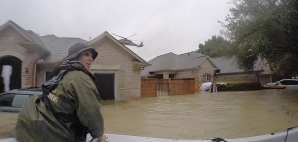Climate
Research Area block
Climate change is one of the most complex environmental challenges the world faces today.

Its impact encompasses physical, ecological, economic, political and ethical issues. Public and political opinions may be divided on what drives climate change, but the science is undeniable. We must seek ways to adapt to climate change on multiple fronts, even as we address its underlying causes. Stanford Woods Institute researchers are creating climate models for economic impact studies and energy and environmental policymaking. Some are assessing climate vulnerabilities and shifting public perspectives on climate change issues. Others are looking closely at ways to assess risk, reduce vulnerabilities and mitigate and adapt to impacts.
Research Centers and Programs

Center for Ocean Solutions »
The Center for Ocean Solutions (COS) is a collaboration among Stanford University (through the Stanford Woods Institute and the Hopkins Marine Station), the Monterey Bay Aquarium and the Monterey Bay Aquarium Research Institute (MBARI). COS develops knowledge to solve ocean challenges.

Center on Food Security and the Environment »
A joint effort with the Freeman Spogli Institute for International Studies, the Center on Food Security and the Environment (FSE) addresses the challenges of feeding the world's growing population without depleting the planet’s natural resources.

Stanford Environment Assessment Facility »
The Stanford Environment Assessment Facility (SEAF) is investigating how to make the process of assessment more effective, unleashing intellectual power towards pressing environmental challenges and opportunities.
Other Research Centers and Programs
Environmental Venture Projects
Realizing Environmental Innovation Program
News & Press Releases

Stanford Experts on Hurricane Harvey Impacts »
Stanford experts comment on how climate change and infrastructure planning contribute to the severity of impacts from extreme weather events like Hurricane Harvey.
By Devon Ryan,
View More News & Press Releases
Media Coverage
What Climate Scientists Want You to See in the Floodwaters »
Katharine Mach, a senior research scientist and director of the Stanford Environment Assessment Facility, and Miyuki Hino, a Ph.D. candidate in Stanford’s Emmett Interdisciplinary Program in Environment and Resources, discuss how we would better approach climate change in order to understand how extreme weathers occur and the steps we can take to prevent or lessen future disasters
By Kathrine Mach and Miyuki Hino,
Publications
Published Work
The growing role of methane in anthropogenic climate change »
IPCC expert meeting on detection and attribution related to anthropogenic climate change »
The Global Methane Budget: 2000–2012, Earth Syst. Sci. Data Discuss »
The Global Methane Budget: 2000–2012, Earth Syst »






